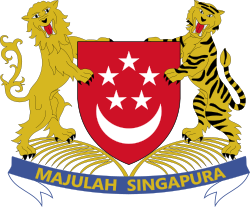| This article is part of a series on |
 |
|---|
Elections in Singapore comprise two types: parliamentary and presidential elections. Under the Constitution of Singapore, a general election must be held within three months of the dissolution of Parliament, which has a maximum term of five years from the date of its first sitting. Presidential elections are held every six years. All elections in Singapore operate under the first-past-the-post voting (FPTP) system.
Contents
- Parliamentary elections
- Political climate
- Latest general election
- Presidential elections
- Latest presidential election
- Referendums
- Past elections
- Legislative Council elections
- Legislative Assembly elections
- Parliamentary elections 2
- Other elections
- Municipal Commission elections
- City Council elections
- National referendums
- Federal & State elections for Malaysia
- Presidential elections 2
- Party election
- See also
- Footnotes
- References
- External links
Singapore employs an official sample count system to provide early indications of election outcomes. At each polling station, a counting assistant randomly selects 100 ballots, which are then tallied to produce a mini-sample. These samples are aggregated and weighted according to the number of votes cast at each station to generate constituency-level projections. Based on simple random sampling, the estimates typically achieve a 95% confidence level with a margin of error of 4–5%. This system is designed to offer a statistically reliable and timely snapshot of the likely results shortly after the close of polls. [1] In contrast, countries such as the United States, United Kingdom and Australia rely on the progressive counting and real-time reporting of actual vote returns from precincts or count centres. While this approach offers greater transparency at a granular level, it generally results in slower reporting compared to Singapore's sample-based method. [2]
Unlike many other countries where elections are administered by independent electoral commissions, elections in Singapore are conducted by the Elections Department Singapore (ELD), which is a department under the Prime Minister's Office (PMO) of the Government of Singapore. On polling day during elections, voting takes place from 08:00 to 20:00 SST (UTC+08:00). Sample count results are typically released by 22:30, with final results announced by the Returning Officer by approximately 03:00 the following morning. Victory parades by elected candidates in their respective constituencies customarily commence at 08:30 later that day. [3] [4]
The last presidential election was held in 2023, which was won by Tharman Shanmugaratnam with 70.41% of the vote. The last general election was held in 2025, which elected 97 seats to the unicameral Parliament of Singapore. Since the 1959 Singaporean general election, the People's Action Party (PAP) has maintained a dominant position, consistently securing a supermajority of seats and forming the government in every successive general election.
